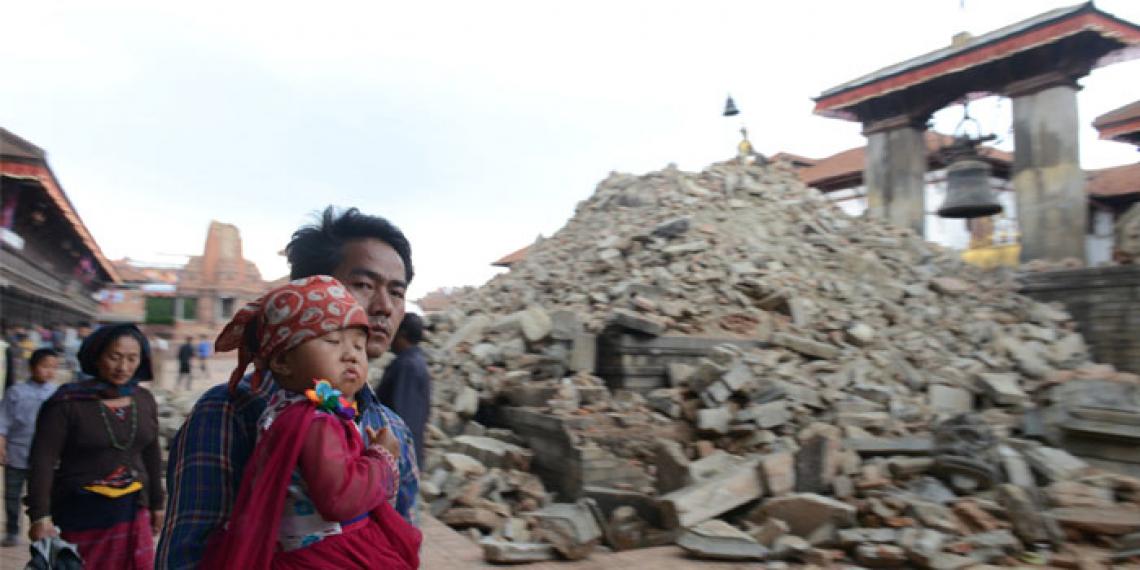You are here
Salvation Army Appeal for Nepal

A magnitude 7.8 earthquake struck Nepal early on the morning of Saturday 25 April, devastating the capital region of Kathmandu. Early reports suggest that more than 5000 people have died and communities and businesses have been destroyed. This was the worst earthquake to hit the area since 1934, when a reported 10,000 people lost their lives following an 8.2 magnitude quake. Nepal has struggled with high unemployment, poverty and hunger for many years. There are fears that as many as 10,000 people may have been killed through this earthquake also.
Salvation Army international leader General André Cox is calling on Salvation Army territories, commands and regions, as well as individual Salvationists and friends of The Salvation Army, to support the organisation’s Nepal Earthquake Appeal. ‘The Salvation Army is present, we are known, and we have a responsibility to step up and support the relief and rebuilding efforts, and I am inviting Salvation Army leaders around the world to support this appeal,’ he said.
The India Eastern Territory, which oversees Salvation Army work in Nepal, is sourcing food, water and other essentials.
An experienced team of Salvation Army disaster workers—Damaris Frick, from International Emergency Services (based at International Headquarters), Colonel Carol Telfer and Major MacDonald Chandi (both based in Pakistan)—are now in Kathmandu. They will work alongside the Salvation Army officers in charge of the ministry in Nepal, Majors Lalsangliana Vuite and Lalnunsangi Ralte, who pioneered the Army’s work in Nepal since 2009. The couple serve with their two daughters Amelia (21), and Rebecca (18).
The Salvation Army has about 200 members in Nepal. It operates a community development centre that offers tailoring and craft opportunities for indigenous women, as well as an after-school care programme helping children who have no one to take care of them, teaching them and helping them do their homework. The Salvation Army also recently opened the Sisters Café for vulnerable women.
When the earthquake struck, Major Ralte says Salvationists were worshipping. Because Saturday is a holiday in Nepal, Salvationists meet then, as Sunday is the first day of the working week. ‘There was a great rumbling sound and the whole ground was shaking,’ he said. ‘Outside, people were shouting and calling out to their respective gods. The pipelines and the water tank broke off the roof. The house was shaking so much that it was difficult to get to the door, but after some time, we managed to get out.’
The family spent three nights outside, and on the fourth night returned to their house. All the shelves and various items—including desktop computers and projectors—had fallen down and were blocking the door. There were many aftershocks—I couldn’t count them all. ‘We went in and out many times, despite the danger, but we were too hungry not to try to get some food. In between the aftershocks, we went out and prayed with our people because they were so afraid. Our members felt much safer just being with us. This is the very reason why we are here.’
The Sisters Café that and its supplies were badly damaged. This is a very important ministry that 11 families depend on, says Major Ralte. The café business began out of an awareness of the struggle for Nepalese women to gain meaningful employment, which makes them vulnerable to poor working conditions. Sisters Café aims to provide a place for Nepalese women to be trained as waitresses, beauticians or chefs.
The Salvation Army team in Nepal is grateful for all promises of assistance and they also value the prayers being offered by people across The Salvation Army and beyond.
• Please donate to The Salvation Army’s Nepal Earthquake Appeal